#paris climate agreement
Text
According to a new survey, lawmakers are playing an increasingly important role in holding corporations and governments accountable for failures to tackle the climate crisis.
The research was done by Columbia Law School, and was commissioned by the United Nations Environment Program (UNEP). It revealed that the number of climate-related court cases has more than doubled since 2017 and is steadily rising around the world.
Their report confirms a trend highlighted in the World Economic Forum’s Global Risks Report 2023, which claimed that individuals and environmental organizations were, more and more, turning to the law, as it became clear that the pace of transition to net-zero emissions was too slow.
“Climate litigation is increasing and concerns about emissions under-reporting and greenwashing have triggered calls for new regulatory oversight for the transition to net zero,” the Forum report said.
The UNEP report catalogues a number of high-profile court cases which have succeeded in enforcing climate action. In 2017, when climate case numbers were last counted, 884 legal actions had been brought. Today the total stands at 2,180.
The majority of climate cases to this date (1,522) have been brought in the US, followed by Australia, the UK, and the EU. The report notes that the number of legal actions in developing countries is growing, now at 17% of the total.
Climate litigation is also giving a voice to vulnerable groups who are being hard hit by climate change. The report says that, globally, 34 cases have been brought by children and young people, including two by girls aged seven and nine in Pakistan and India.
Here are five of the climate breakthroughs achieved by legal action so far.
1. Torres Strait Islanders Vs Australia
In September 2022, indigenous people living on islands in the Torres Strait between northern Queensland and Papua New Guinea won a landmark ruling that their human rights were being violated by the failure of the Australian government to take effective climate action.
The UN Human Rights Committee ruling established the principle that a country could be in breach of international human rights law over climate inaction. They ruled that Australia's poor climate record was a violation of the islanders’ right to family life and culture.
2. The Paris Agreement is a human rights treaty
In July 2022, Brazil's supreme court ruled that the Paris climate agreement is legally a human rights treaty which, it said, meant that it automatically overruled any domestic laws which conflicted with the country’s climate obligations.
The ruling ordered the government to reopen its national climate mitigation fund, which had been established under the Paris Agreement.
3. Climate inaction is a breach of human rights
Upholding an earlier court ruling that greenhouse emissions must be cut by 25% by 2020, the Netherlands Supreme Court ruled that failure to curb emissions was a breach of the European Convention on Human Rights.
The December 2019 ruling stated that, although it was up to politicians to decide how to make the emission cuts, failure to do so would be a breach of Articles 2 and 8 of the Convention which affirm the right to life and respect for private and family life.
4. Companies are bound by the Paris accord
Corporations, and not just governments, must abide by the emissions reductions agreed in the Paris climate treaty. This principle was established by a 2021 ruling in the Netherlands brought by environmentalists against energy group Royal Dutch Shell.
The court ordered Shell to cut its CO2 emissions by 45% by 2030 bringing them in line with Paris climate targets. The judge was reported as saying there was "worldwide agreement" that a 45% reduction was needed, adding: "This applies to the entire world, so also to Shell”.
5. Courts overturn state climate plans
Up until now, three European governments have been defeated in the courts over their climate plans.
In March 2021, Germany’s highest court struck down a climate law requiring 55% emissions by 2030 cuts, ruling it did not do enough to protect citizens’ rights to life and health. The same year, the French government was ordered to take “immediate and concrete action” to comply with its climate commitments. And in 2022, the UK’s climate strategy was ruled unlawful for failing to spell out how emissions cuts would be made.
#climate change#climate#hope#good news#more to come#climate emergency#news#climate justice#hopeful#positive news#long post#important#good post#links#for future reference#law#climate law#paris agreement#paris climate agreement#government#democracy#politicians#economics#politics
59 notes
·
View notes
Text
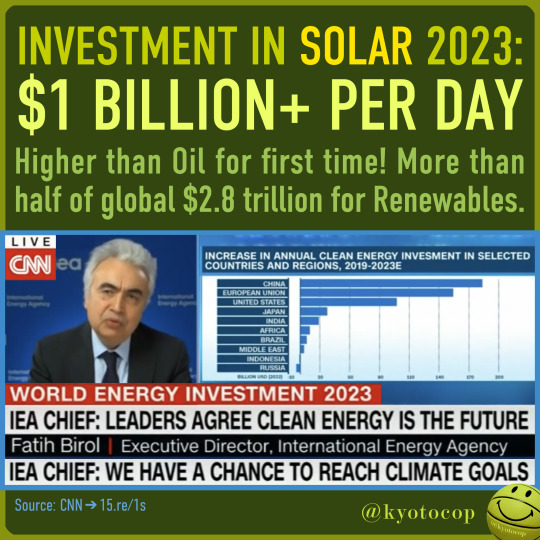
We're making fast progress, change is here.
#Solar Power#Solar#wind power#Windpower#Clean Energy#Renewable Energy#Renewables#Kyoto Protocol#Paris Climate Agreement#Climate Change#KyotoCOP#Climate Goals#Climate News#Climate Good News#Good Climate News#positive News#positive Climate News
13 notes
·
View notes
Text

The past eight years were the eight warmest years on record, and 2022 was the fifth-warmest on record globally, according to the European Union's Copernicus Climate Change Service.
Why It Matters: The ranking, released Tuesday morning, shows the planet continues its long-term warming trend in response to growing amounts of greenhouse gases.
• Each of the past 8 years had global average temperatures more than 1°C above the preindustrial level, as the world nears the 1.5°C guardrail established by the Paris Climate Agreement.
• Studies show that the odds of potentially catastrophic climate impacts increase significantly if warming exceeds 1.5°C compared to preindustrial levels.
Of Note: The third year in a row of La Niña conditions in the tropical Pacific Ocean helped depress global average surface temperatures slightly, keeping 2022 from hitting the top three warmest years.
• There are signs, however, that La Niña may soon wane, and potentially give way to an El Niño event during 2023.
• If this were to happen, it would raise the chances for a new all-time record warm year.
The Big Picture: Global average temperatures in 2022 were 0.3°C (0.54°F) above the 1991-2020 baseline, and the year was the second-warmest on record for Europe, behind 2020.
• Europe had its hottest summer on record, accentuated by all-time record high temperatures set in several countries, including the United Kingdom.
• The UK Met Office has found 2022 was its warmest year on record dating all the way to 1659. It was also its first year with an average temperature above 10°C (50°F). France also had its hottest year.
• Areas that saw their warmest year on record include large parts of western Europe, the Middle East, Central Asia and China, northwestern Africa and the Horn of Africa, among others, Copernicus found.
• Worldwide, extreme heat struck Pakistan and northern India during the spring before devastating flooding rains hit the region in late summer. Central and eastern China saw record hot and dry conditions for an extended period over the summer.
Between The Lines: Studies tied these and other extreme weather and climate events to human-driven climate change.
• Research published in September found that climate change may have increased five-day rainfall amounts in the hardest-hit areas of Pakistan by up to 50%.
• Another climate attribution study found that the U.K. heat wave, which peaked in mid-July, was at least 10 times more likely to occur in today's warmer climate compared to the preindustrial era.
Of Note: There were a fair share of precipitation extremes in 2022 as well, with the floods in Pakistan, extreme drought in the Horn of Africa that is pushing that region into a famine, and a series of record floods in Australia.
What's Next: Annual numbers are expected later this week from NOAA and NASA.
#news#axios#2023#2022#climate reform#climate emergency#climate crisis#climate change#global warming#droughts#record rainfall#record heatwaves#world news#world politics#Copernicus Climate Change Service#european union#greenhouse gases#Paris Climate Agreement#La Niña#El Niño#UK Met Office#europe#asia#africa#middle east#floods#noaa#nasa
15 notes
·
View notes
Text
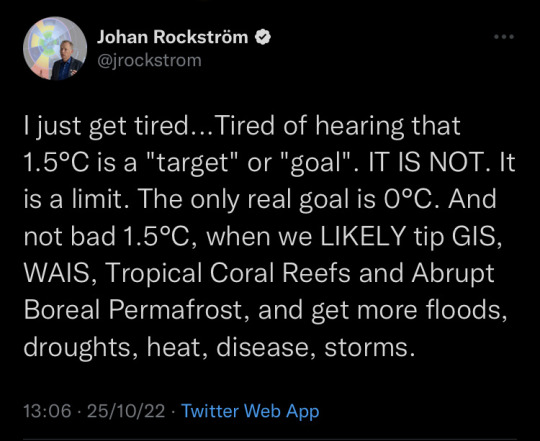
View on Twitter

(Source)
#Climate Change#climate science#Climate Crisis#cop27#paris climate agreement#climate goals#Late Stage Capitalism#My Tweets
18 notes
·
View notes
Text
2 notes
·
View notes
Link
2023 “smashed” the record for the hottest year by a huge margin, providing “dramatic testimony” of how much warmer and more dangerous today’s climate is from the cooler one in which human civilisation developed.
The planet was 1.48C hotter in 2023 compared with the period before the mass burning of fossil fuels ignited the climate crisis. The figure is very close to the 1.5C temperature target set by countries in Paris in 2015, although the global temperature would need to be consistently above 1.5C for the target to be considered broken.
Scientists at the EU’s Copernicus Climate Change Service (CCCS) said it was likely the 1.5C mark will be passed for the first time in the next 12 months.
0 notes
Text
#science#science communication#scicomm#stem#science education#science blog#environmental science#climate and environment#climate crisis#climate disaster#environment#climate change#paris climate agreement
0 notes
Link
Based on the news I read today, I wished the report had had more specifics like what are wrong and what can be done, which is contrary to IPCC Chief's comment mentioned in the article though. If put cynically, is the report made for governments instead of people (do you want us to sprint really?)?
Anyway, it seems in a nutshell, we need to rely on renewable energy, but my country, Japan is not progressing as well as hoped in this field. In my opinion, if warfare still continue on this earth, I wouldn't see the efforts to prevent severe Climate Crisis would become meaningful. So, Russian invasion into Ukraine, Civil War in Syria and so forth are the touchstone of world communities' ability to tackle with a very important global issue like Global Warming as well because for the world to unite, we need to trust each other. If hate overpowers trust, our efforts to unite and to achieve a global goal would come to nothing.
#the U.N. science report#IPCC#paris climate agreement#Climate Change#Renewable energy#Russia's invasion of Ukraine#limiting warming to 1.5 degrees Celsius
0 notes
Text
UNEP FI Toolkit for Impact Management.
youtube
UNEP FI is pleased to launch the Impact Protocol for Banks, along with the latest Module of Version 3 of the Portfolio Impact Analysis Tool for Banks, marking the consolidation of a full toolkit for impact management for banks.
In 2017 UNEP FI’s Principles for Positive Impact Finance put forward a new, holistic, approach to impact management by private financial institutions, involving the systematic consideration of both positive and negative impacts across the three pillars of sustainable development (environmental, social, socio-economic).
In 2019, UNEP FI released the Principles for Responsible Banking (PRB), which requires signatory banks to align their core strategy, decision-making, lending and investment with the Sustainable Development Goals, and international agreements such as the Paris Climate Agreement. To achieve this, Principle 2 requires banks to perform an impact analysis of their portfolios, to identify their most significant impact areas and to set impact targets and action plans accordingly, so as to manage their positive and negative impacts.
The Impact Protocol provides a step-by-step overview of how to analyse and manage bank portfolio impacts as per UNEP FI’s holistic impact approach, and in conformity with the requirements of the Principles for Responsible Banking.
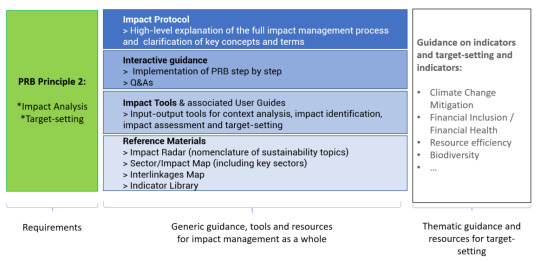
#private financial institutions#public financial institutions#Principles for Responsible Banking#UNEPFI#United Nations Environment Programme Finance Initiative#Banks#Impact Protocol#Sustainable Development Goals#Paris Climate Agreement#Youtube
0 notes
Link
Geopolitics is the study of how countries interact with each other based on their geographical locations. In this article, we'll take a geopolitical tour of the United States of America during the Biden era. We'll explore how the new administration is impacting America's relationships with other countries, and what implications this has for the future of international relations.
The current political landscape of the United States
The current political landscape of the United States is one of great divide. The country is split between those who support President Biden and those who oppose him. There are also a large number of people who are undecided or don't really have a strong opinion either way. This division has led to a lot of heated debates and arguments, both online and in person. It seems that no one can agree on anything anymore.
This divide is most evident when it comes to the issue of immigration. There are those who believe that all immigrants should be welcomed into the country, regardless of their legal status. Then there are others who believe that only those who come to the country legally should be allowed in. And then there are those who think that the country should close its borders entirely. No matter what your opinion on this issue is, it's clear that it's a very divisive topic.
The same can be said for the issue of gun control. There are some who believe that there should be stricter gun laws in place, while others believe that the government has no business telling people what they can and cannot do with their guns. Again, this is an issue that divides people very strongly.
These are just a few examples of the
The Biden administration and its policies
The United States of America has a new leader and a new direction. The Biden administration has promised to bring change to the country, both domestically and internationally. How will this new era in American politics affect the rest of the world?
The election of Joe Biden as the 46th president of the United States was a turning point in American politics. After four years of Republican rule under Donald Trump, the US is now set to embark on a new course under the leadership of Biden and his Democratic Party.
What can we expect from the Biden administration? What kind of impact will it have on the global geopolitical landscape?
read more : https://www.vetopower.org/2022/05/a-geopolitical-tour-of-united-states-of.html
0 notes
Text
youtube
The US passed the world's biggest climate bill EVER (so far!) in 2022 and most people have no idea!!!
This video digs into all of the different awesome things the Inflation Reduction Act does - and why it puts the US back on track to potentially meet our Paris Agreement commitments.
Yall, the Inflation Reduction Act changed the whole game when it comes to climate change in the US. In fact, it's in large part why climate experts (and Hank Green, in this video) say that as of 2022,
We have more reason to have hope that we can save ourselves than we have EVER had, since we started to realize the true extent of climate change
Note: If you're wondering why the biggest climate bill in US history was passed under the name "Inflation Reduction Act," the answer seems to mostly be that it's easier to actually get shit done on climate if the name of the bill doesn't tell everyone that's what you're doing. (Also like. It was designed to reduce inflation too. Just, yknow. Not only.)
Transcript here! (There is a full transcript, it just might not look like it because it's not super clear that the text scrolls at first. Ask me how I know lol.)
-via Vlogbrothers, August 12, 2022
#climate change#sustainability#us politics#united states#green energy#renewable energy#solar power#wind power#green jobs#infrastructure#paris agreement#biden#democrats#us congress#voting matters#good news#hope#vlogbrothers#hank green#hope posting#video#transcript available#Youtube
642 notes
·
View notes
Text
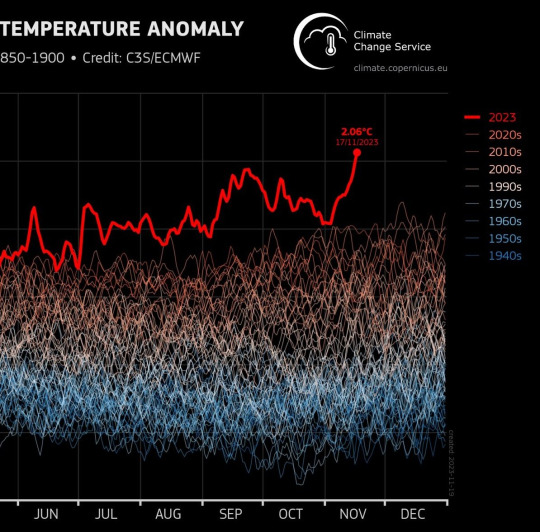
first days past +2.0C yipeeee!!!
#climate collapse#ecology#politics#listen sis i promise if we slow down to 'carbon neutral' by 2050 like in the paris agreements we can totally stay below 1.5C#sis i promise#el nino 2024 gonna be fun
19 notes
·
View notes
Text
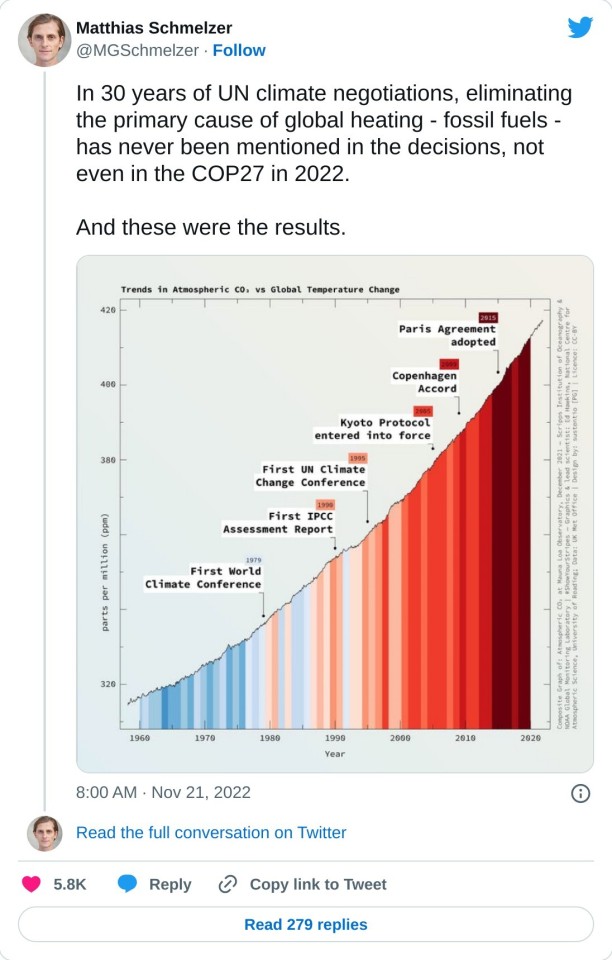
View on Twitter
In 30 years of UN climate negotiations, eliminating the primary cause of global heating—fossil fuels—has never been mentioned in the decisions, not even in the COP27 in 2022.
(Source)
#Climate Change#Late Stage Capitalism#end fossil fuels#cop27#paris climate agreement#un climate change conference#My Tweets#Climate Crisis
2 notes
·
View notes
Text
By Damian Carrington
The Guardian
June 15, 2023
Rich countries are signing a “death sentence” for millions of poor people around the world by failing to phase out fossil fuels, the climate activist Greta Thunberg has told governments.
She warned on Tuesday that with annual greenhouse gas emissions at an all-time high, only a “rapid and equitable” phaseout of fossil fuels would keep global temperatures within the scientifically advised limit of 1.5C above pre-industrial levels.
“The coming months and years – right now – will be crucial to what the future looks like. It is what we decide now that will define the rest of humanity’s future,” she told a press conference at UN talks in Bonn, where governments are meeting to discuss the climate crisis.
“If we do not [phase out fossil fuels], it will be a death sentence for countless people. It is already a death sentence for countless people,” she said.
Thunberg last Friday announced the end of her school strikes, which she has been undertaking on Fridays since 2018 in protest at political inaction on the climate crisis. The campaigner has left school but intends to carry on speaking out on climate issues, while also giving the spotlight to youth voices from the developing world.
She said a lack of political will to halt fossil fuel exploration and use was threatening to raise global temperatures by more than 1.5C above pre-industrial levels, which could lead the climate to pass “tipping points”, a cascade of impacts that could create runaway global heating.
“We are still rushing towards the cliff. We could trigger feedback loops that are beyond human control, that would throw countless billions under the bus,” she said.
The question of phasing out fossil fuels is expected to be a flashpoint at the Cop28 UN climate talks later this year. The summit will take place in Dubai, hosted by the United Arab Emirates, a major oil and gas producer.
Many countries would like to see Cop28 produce a formal resolution to phase out fossil fuels, or at least to discuss such a phaseout as an official agenda item at the summit. But some countries, chiefly fossil fuel producers including Saudi Arabia, are staunchly opposed, and the UAE presidency has been cautious, saying there is not yet agreement on the agenda.
Chairing the talks will be Sultan Al Jaber, a minister in the UAE government who is also chief of the country’s national oil company, Adnoc, which is planning a massive expansion of fossil fuel production capacity.
Eric Njuguna, a climate justice organiser from Kenya, speaking with Thunberg, said Al Jaber’s dual role was a conflict of interest, and called on him to resign. “It is a stab in the back for poor countries to have a fossil fuel CEO on top of efforts to constrain the climate crisis,” he said.
Al Jaber has told the Guardian he will bring a “business mindset” to the talks, and pointed to his role as co-founder of the Masdar renewable energy company in UAE. He visited the Bonn talks last Thursday, and told a public meeting: “The phase down of fossil fuels is inevitable.” But he stopped well short of promising to put a phaseout of fossil fuels on the Cop28 agenda.
The talks in Bonn, which started last Monday and will end on Thursday, are to lay the groundwork for Cop28, the conference of the parties under the UN framework convention on climate change, which begins on 30 November.
Progress at Bonn has been slow. Last week’s discussions were characterized by disputes over rich countries that are failing to provide financial assistance to developing countries, to help them cut their greenhouse gas emissions and cope with the impacts of the climate crisis.
Alden Meyer, a senior associate at the thinktank E3G, said: “Much more work remains to be done to land an agreement at Cop28 for a just and equitable reduction of fossil fuel production and use in a time frame that’s consistent with the Paris [agreement] 1.5C goal.”
#climate crisis#greta thunberg#climate change#climate activism#cop28#sultan al jaber#paris agreement#fossil fuel production
34 notes
·
View notes
Text
On This Day In History
December 12th, 2015: The Paris Agreement under the United Nations Framework Convention on Climate Change is adopted.
68 notes
·
View notes